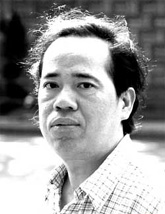
施施然
Shi Shi-Ran
 
施施然,本名袁诗萍,诗人,画家,河北文学院签约作家,曾获河北省政府“文艺振兴奖”、《现代青年》“最受读者喜欢十大青年诗人”、三月三诗人奖、等,部分诗作被译为英语、瑞典语、韩语等语言交流,出版诗画集《走在民国的街道上》(台湾)、诗集《青衣记》、《杮子树》等。《海风》杂志副主编。国画作品多次入选国际国内画展。
Shi Shi-Ran, originally named Shi-Ping Yuan, signed writer of Hebei College of Liberal Arts, won the "Literary Revitalization Award" in Hebei province and “March-Third Poet Award”. She has published her book of poetry Tsing Yi Notes, and Persimmon Tree as well as her collected album of poetry and painting: Walking on Republic Street of China. She is the Deputy Chief Editor of the literary journal The Sea Breezes.
|

|

译者
Translator
海岸
Hai An
 
海岸(1965- ),诗人、翻译家,浙江台州人。原名李定军,八十年代就读于杭州大学(现并入浙江大学)外文系,现为复旦大学外文学院副教授兼香港《当代诗坛》(汉英双语)副主编。著有《海岸诗选》(2001)、《海岸短诗选》(2003)、《挽歌》(长诗,2012);译有《狄兰-托马斯诗选》(2014)、《贝克特诗集》(2016);编有《中西诗歌翻译百年论集》(2007)、《中国当代诗歌前浪》(汉英对照,2009)等。曾应邀出席“第15届阿根廷-罗塞里奥国际诗歌节”(2007)等国内外诗歌节。
Hai An (1965-), originally Li Ding-Jun, Chinese poet and translator, the Council Member of the Shanghai Translator Association (STA), the prize-winner of STA-2011 Translator Prize and the invited author of UNESCO-EOLSS Encyclopedia in 2004. He graduated from the Hangzhou University in the 1980s, currently serving as the Associate Professor at College of Foreign Languages and Literature, Fudan University and the Adjunct Deputy Editor-in-Chief of Contemporary Poetry Quarterly based in Hong Kong. He has published more than ten books of poetry as the author, translator and editor, including Selected Poems by Hai An(2001), Selected Short Poems by Hai An (2003, Hong Kong), Elegy—Hai An's First Therapeutic Long Poem (2012, Taiwan), Selected Poems of Dylan Thomas (2014), Collected Poems of Samuel Beckett (2016), A Centennial Collected Papers on Sino-Occidental Poetry Translation (2007), The Frontier Tide: Contemporary Chinese Poetry (Europe / Qinghai, 2009), etc. He was invited to attend several international poetry festivals.
|
已经过了台北,公路两旁
的槟榔树下,日光
在丛林和水草中游动。穿过
低矮错落的防震楼,大巴车平稳地
向台南驶去。“给老爷太太们
请安”。杨导游还在继续他,准确说
是他的母亲的回忆:1948年
在“大撤退”潮中作为
一位国民党连级军官的姨太太
她和丈夫一起,在福建一个码头
登上了开往台湾的船——
在我们常见的电影中,她至少是
情感的胜利者。不是吗?
她取代了大太太。
而她未来的儿子,此时正大声地
告诉我们接下来的事情。
是的,她和他待在一起
但现在,限乘750人的船
铁板一样竖立着两千多个
在密不透风的对峙中
不分男女弱孺,肉紧贴着肉
人们站着呕吐。
站着哭骂。站着
咽气。十几个风雨颠沛的昼夜
她一路上耳听死去的人被
扔进海中。那惊心的
“扑通”声。是动物的
求生本能,使这个刚踏进婚姻的旧式女人
挣扎着,从脚下一片排泄物的汪洋
不,是从一场战争中
活下来。像沧海中的一粒砂。
|
|
Passing by Taipei, under the betel tree
along the highway, the sunlight
swimming down water grasses in the jungle,
through the shockproof houses, scattered low,
the coach goes smoothly toward Tainan. “Morning,
Ladies and Gentlemen”. Yang, the tour guide, more precisely,
keeps on his mother's memory, in 1948
in the tide of "great retreat",
as the mistress of a KMT junior officer,
She, together with her husband, on a quarside in Fujian
boarded on the ship bound for Taiwan --
In our familiar movie, at least she is
the winner of emotion, isn't she?
She replaced the first wife.
Her future son is now loudly
telling us the following things.
Yes, she stayed with him.
But then, the ship though limited for 750 passengers,
more than two thousand stood in iron cabin,
straight in the impenetrable confrontation,
male or female, weak or young, flesh to flesh.
They stood to vomit,
to scold and to die.
For a dozen of windy, rainy days and nights
She listened to the dead, along the way,
thrown into the sea. What a horrifying
"splash”. It was the animal surviving instincts
made this old woman, just stepping into marriage
struggle to survive from the boundless fecal waste under her feet,
No, to survive from a battle,
as a grain of sand in the sea.
|







